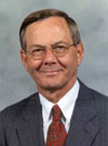 When Charles Wilson, M.D., dropped his pre-med major to take more philosophy, art, literature and history his undergraduate counselor’s words echoed in his head.
When Charles Wilson, M.D., dropped his pre-med major to take more philosophy, art, literature and history his undergraduate counselor’s words echoed in his head.
“Mark my words, young man. You will never get into medical school.”
Undeterred, Dr. Wilson majored in English literature and, in 1964, received his medical degree from Northwestern University Medical School. “I have never regretted doing that (quitting the official pre-med program),” he said Wednesday to a crowd of UNMC physicians, students and staff.
“There’s a lot more to pre-med than just giving students the basic sciences,” said Dr. Wilson, who serves on the University of Nebraska Board of Regents. “You can major in history or literature or art and still go to medical school.My colleagues often tell me ‘if I had to do it over again I’d take more – you fill in the blank.’ ”
Believing a broad education is important, Dr. Wilson and his wife, Linda, founded the Humanities in Medicine program at the University of Nebraska-Lincoln to emphasize the humanities in pre-medical education and the importance for life-long learning. Dr. Wilson hopes to increase the program’s connection to UNMC, particularly in regards to programming.
Birth control, stem cell research, cloning and the medical definition of brain death didn’t exist in 1964, when Dr. Wilson graduated from medical school. “The science has all changed, but there are certain core human understandings that are still very relevant to the practice of medicine,” he said.
Knowing the science of medicine doesn’t prepare physicians for “macro” issues, such as the debate between what physicians “can do” and “should do,” he said. Physicians often aren’t represented in the legislative decision-making process, “yet these bodies regularly deal with issues that affect medicine and all of us,” he said, urging greater leadership.
Dr. Wilson advocates three goals in any pre-med education: 1) learning basic science principles; 2) developing empathy, which he calls a “cardinal value of clinical physicians,” through literature and art; and 3) attaining respect by gaining a greater perspective of one’s place in the community, culture, world and context of history.
Beyond biology and chemistry, pre-medical and medical students should understand why and how historical events transpired and the ramifications of events such as the migration out of the Garden of Eden in Africa, the black plague in Europe and Cortez defeating the Aztec empire. That historical foundation provides lessons for dealing with today’s issues of germ warfare, Avian flu, and the AIDS epidemic in Africa.
Reading literature helps students develop empathy, he said, citing such works as The Hunchback of Notre Dame, Frankenstein, Sherlock Holmes, Heartsounds, Fortunate Son and Tuesdays with Morrie.
Shannon Kinnan of Gretna, a third-year med student who graduated from UNL’s Humanities in Medicine program in 2001, thanked Dr. Wilson for the program, which provides scholarship assistance. “It was great preparation and I am much more culturally competent,” she said.
Rosaline Olade, Ph.D., associate professor in UNMC’s College of Nursing, said the Humanities in Medicine program is “the best thing that has ever happened to (her daughter),” who just graduated from UNL.
A retired cardiologist with the Nebraska Heart Institute in Lincoln, Dr. Wilson has served as clinical professor of medicine at UNMC since 1974. He is the medical director of the BryanLGH Medical Center Ultrafast CT Scanner and medical director of the BryanLGH College of Medical Sciences’ School of Allied Health.
He was elected to the NU Board of Regents in 1990 and has served twice as chairman and twice as vice-chairman. He spent four years on active duty with the U.S. Army Medical Corps, including service in Thailand during the Vietnam War.